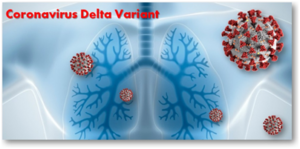Sometimes Blood Glucose levels Increases as a result of SARS-CoV-2 Infection: Research Reports

Dr. Shuvomoy Banerjee, PhD; Neucrad Health desk, August 25, 2020
Many of the patients who are being hospitalized for Covid-19 are in critical condition for two main reasons: 1) High Blood Pressure and 2) Diabetes.
The second reason has recently caused concern in the scientific community as because previously they were considering that diabetic patients suffer critically on being infected with SARS-CoV-2. However, recent studies have revealed that people who never have diabetes are surprisingly developing high levels of glucose in their blood after being infected by SARS-CoV-2! Physicians and Doctors are referring this condition as “Stress Hyperglycemia“.
Stress Hyperglycemia and Covid-19:
Covid-19 is well known to create ‘cytokine storm’ in the patient’s body, where various cytokine protein levels increase dramatically due to over-activation of the immune system. Scientists believe that this causes abnormal ‘stress’ in the patient’s body and disturbs the balance of all hormones responsible for regulating blood glucose levels. Henceforth, high blood glucose or stress hyperglycemia occurs.
Details of Hyperglycemia during SARS-CoV-2 infection:
A recent study in the United States found that 1,122 corona patients admitted to 8 different hospitals. Among them, 28.8% patient died in critical condition with symptoms of hyperglycemia. Compared to that, the mortality rate of patients without hyperglycemia is much lower i.e. only 6.2%.
Dr. Antonio Ceriello, a physician in the Department of Diabetes at the Scientific Institute for Research, Hospitalization and Healthcare Multimedia (Italy), has recommended that the Covid-19 patients admitted to the hospital must be tested for glucose levels. If there is excessive glucose in the blood, it should be ‘normalized’ through appropriate treatment and brought back to normal levels to reduce the risk of the patient.
Dr. Ceriello has discovered the molecular mechanism of how hyperglycemia helps SARS-CoV-2 to enter the body’s cells and his research work has been published in the journal “Diabetes Research and Clinical Practice”. According to Dr. Ceriello, SARS-CoV-2 infection causes an inflammatory reaction in the body leading to increase in the amount of blood glucose. Interestingly, the excess glucose enhances the “Glycosylation” of the Angiotensin-Converting Enzyme-2 (ACE2) receptor proteins which are located in the lung epithelial cell membrane. These processes actually facilitate the entry of SARS-CoV-2 into the cell leading to further critical conditions!
Of note, Dr. Pedro M. Moraes-Vieira, Professor of Genetics at the University of Campinas in Brazil gave an important statement for this context. He found that monocytes and macrophages accumulate in large amounts around the lung cells of Covid-19 patients. Moreover, infection with SARS-CoV-2 produces large amounts of Reactive Oxygen Species (ROS), from the mitochondria of these immune cells. Under its influence, Hypoxia Inducible Factor-1-alpha (HIF-1-alpha; a transcription factor) increases the transcription rate of different glycolytic genes. It has also been demonstrated that the amount of glucose in the body is too high at this time, resulting in massive disruption of glucose metabolism in the immune cells. Dr. Moraes-Vieira’s research has shown that this altered metabolism is responsible for causing the “cytokine storm.” Scientists believe that this phenomenon greatly reduces the effectiveness of T-lymphocytes leading to rapid death of lung’s epithelial cells and may be the main cause of Covid-19 pneumonia too!
Therefore, scientists are emphasizing to test the blood glucose levels in the Covid-19 patients and are also focusing on research and therapeutic interventions for reducing the amount of excess glucose in SARS-CoV-2 infected patients. They are considering the use of hypoxia Inducible factor 1-alpha inhibitor in the treatment of Covid-19 for this matter. We hope that soon enough we will be able to save more lives in the future from this deadly infection!



References:
- Ceriello A. Hyperglycemia and the worse prognosis of COVID-19. Why a fast blood glucose control should be mandatory. Diabetes Res Clin Pract. 2020;163:108186. doi:10.1016/j.diabres.2020.108186
- Ceriello A, Standl E, Catrinoiu D, et al. Issues for the management of people with diabetes and COVID-19 in ICU. Cardiovasc Diabetol. 2020;19(1):114. Published 2020 Jul 20. doi:10.1186/s12933-020-01089-2
- Ceriello A, Stoian AP, Rizzo M. COVID-19 and diabetes management: What should be considered?. Diabetes Res Clin Pract. 2020;163:108151. doi:10.1016/j.diabres.2020.108151
- Codo AC, Davanzo GG, Monteiro LB, et al. Elevated Glucose Levels Favor SARS-CoV-2 Infection and Monocyte Response through a HIF-1α/Glycolysis-Dependent Axis [published online ahead of print, 2020 Jul 17]. Cell Metab. 2020;S1550-4131(20)30365-X. doi:10.1016/j.cmet.2020.07.007
- Annweiler C, Cao Z, Wu Y, et al. Counter-regulatory ‘Renin-Angiotensin’ System-based Candidate Drugs to Treat COVID-19 Diseases in SARS-CoV-2-infected patients [published online ahead of print, 2020 May 17]. Infect Disord Drug Targets. 2020;10.2174/1871526520666200518073329. doi:10.2174/1871526520666200518073329
- Duette G, Pereyra Gerber P, Rubione J, et al. Induction of HIF-1α by HIV-1 Infection in CD4+ T Cells Promotes Viral Replication and Drives Extracellular Vesicle-Mediated Inflammation. mBio. 2018;9(5):e00757-18. Published 2018 Sep 11. doi:10.1128/mBio.00757-18








